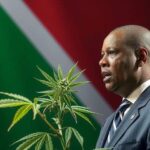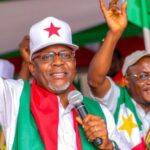Seismic Political Shift in Botswana: BDP Loses Power After 58 Years
In a historic turn of events, Botswana’s President Mokgweetsi Masisi conceded defeat in the recent general election, ending a 58-year rule by the Botswana Democratic Party. The opposition, led by Duma Boko of the Umbrella for Democratic Change, claimed a significant victory, marking the first time another party will govern Botswana since independence. The election results reflect public demand for change amid economic challenges largely driven by the diamond sector’s decline.
The recent general election in Botswana marked a historic turning point as President Mokgweetsi Masisi conceded defeat, ending the Botswana Democratic Party’s (BDP) domination of 58 years since the country’s independence. Masisi acknowledged that his party was trailing behind in fourth place amid a significant rejection by voters, whilst the opposition, led by the Umbrella for Democratic Change (UDC), emerged as the clear frontrunner.
Duma Boko, the UDC candidate, is poised to become the new president with an impressive lead in the initial results. Masisi reached out to inform Boko of his concession, calling him the effectively elected president. Although the final results were still pending, the BDP was not positioned to maintain a parliamentary majority.
In a press conference, Masisi stated, “I concede the election. I am proud of our democratic processes… I will respectfully step aside and participate in a smooth transition process.” He further expressed his intention to support his successor during the transition and aftermath of the elections.
For almost 60 years, the BDP held sway over Botswana’s political landscape, but with this election, the future governance will be in the hands of another party for the first time in its democratic journey. With the UDC capturing 25 out of 61 seats so far, they are nearing a majority in a parliament where the BDP only managed three seats amidst a rising public call for change due to economic challenges.
Botswana is renowned for its stability and high living standards, largely driven by a diamond-dependent economy. However, the country is now facing new economic challenges, with global demand for diamonds waning and unemployment rates soaring, particularly among the youth. Masisi’s administration was criticized for not diversifying the economy, aggravating the current fiscal situation.
The nation’s dire economic plight notably influenced the recent election, as diamonds constitute over 80% of Botswana’s exports and a significant portion of its GDP. Masisi stated that since April, diamond sales from the state-partnered Debswana firm had plummeted.
Botswana’s elections are pivotal, determining parliamentary composition leading to presidential elections; however, this current shift disrupts a longstanding trend of BDP presidents since independence. Duma Boko, a seasoned lawyer, is set to implement significant changes, emphasizing the theme of “Change is Here” in his campaign.
Masisi’s unexpected defeat follows a broader regional trend, mirroring the recent loss of power by the African National Congress in South Africa. The former president concluded, revealing his surprise at the results, noting, “I had not packed a shoe.”
The recent general election in Botswana signifies a transformative moment for the nation, as President Masisi concedes defeat after a long-standing BDP rule. The rise of the Umbrella for Democratic Change, under Duma Boko, highlights a demand for change amid economic struggles linked to the diamond industry. Botswana’s shift to new political leadership marks a significant milestone in its democratic evolution, suggesting a renewed opportunity to address pressing economic challenges. As the BDP acknowledges the urgent need for policy changes, the nation anticipates a potentially impactful transition of power that may redefine its future trajectory.
Original Source: www.nbcnews.com








Post Comment